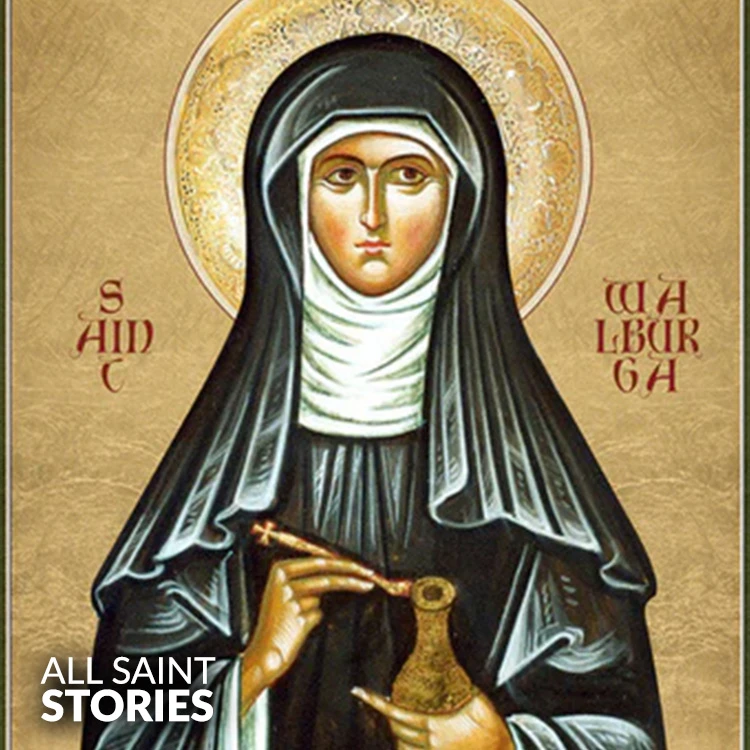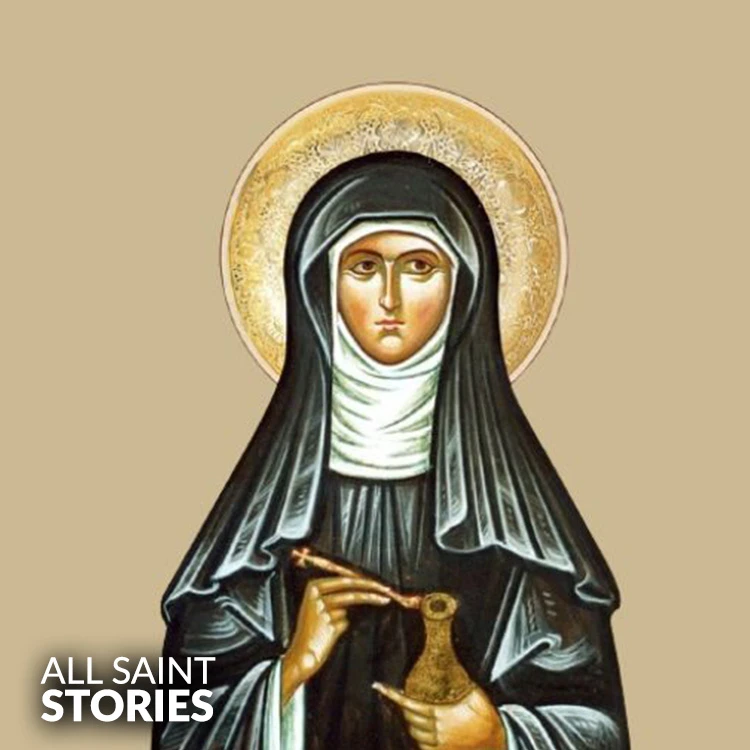St. Walburga, faithful servant of Christ and devoted missionary, intercede for us in our journey of faith. Help us to imitate your courage, humility, and love for the Church. Through your prayers, may we be strengthened in charity and holiness. Amen.
ST. WALBURGA
ST. WALBURGA

St. Walburga was an English missionary and abbess who evangelized in Germany and became known for her healing miracles and deep spiritual wisdom.
St. Walburga was born around the year 710 in Wessex, England, into a devout Christian family. She was the daughter of St. Richard the Pilgrim and the sister of Saints Willibald and Winibald. Raised in the monastic tradition, she entered the double monastery of Wimborne Abbey in Dorset at a young age, where she received a strong spiritual and scholarly formation.
In the early 8th century, Walburga joined her uncle St. Boniface and her brothers in their missionary efforts in the Germanic lands. She sailed from England to the continent as part of the wave of Anglo-Saxon missionaries evangelizing what is now Germany. Her mission took her to the region of Franconia and Bavaria, where she became a key figure in the Christianization of the region.
St. Walburga was eventually appointed abbess of the double monastery at Heidenheim, which had been founded by her brother St. Winibald. As abbess, she led with wisdom and compassion, fostering both the spiritual and educational growth of the nuns and monks under her care. Her leadership was marked by discipline, charity, and deep theological knowledge, which was rare for women in her time.
After her death on February 25, 779, many miracles were reported at her tomb, especially involving a healing oil that flowed from her relics—known as the “Oil of St. Walburga.” This phenomenon contributed to her popular veneration and pilgrimage to her shrine. Her relics were later transferred to Eichstätt, where a church and abbey were built in her honor. The oil continues to flow to this day and is collected and distributed for devotional use.
She was canonized on May 1, 870, by Pope Adrian II. Over time, her cult spread widely throughout Europe, especially in Germany, the Netherlands, and England. Her feast day is celebrated on February 25, though some traditions also commemorate her on May 1 (translation of relics), leading to the association of "Walpurgis Night" in folklore.
Video Not Found
The information on this website is compiled from various trusted sources. While we aim for accuracy, some details may be incomplete or contain discrepancies.
If you notice any errors or have additional information about this saint, please use the form on the left to share your suggestions. Your input helps us improve and maintain reliable content for everyone.
All submissions are reviewed carefully, and your personal details will remain confidential. Thank you for contributing to the accuracy and value of this resource.
Credits & Acknowledgments
- Anudina Visudhar (Malayalam) – Life of Saints for Everyday
by Msgr. Thomas Moothedan, M.A., D.D. - Saint Companions for Each Day
by A. J. M. Mausolfe & J. K. Mausolfe - US Catholic (Faith in Real Life) – Informational articles
- Wikipedia – General reference content and images
- Anastpaul.com – Saint images and reflections
- Pravachaka Sabdam (Malayalam) – Saint-related content and insights
We sincerely thank these authors and platforms for their valuable contributions. If we have unintentionally missed any attribution, please notify us, and we will make the correction promptly.
If you have any suggestion about ST. WALBURGA
Your suggestion will help improve the information about this saint. Your details will not be disclosed anywhere.
© 2026 Copyright @ www.allsaintstories.com





 English
English
 Italian
Italian
 French
French
 Spanish
Spanish
 Malayalam
Malayalam
 Russian
Russian
 Korean
Korean
 Sinhala
Sinhala
 Japanese
Japanese
 Arabic
Arabic
 Portuguese
Portuguese
 Bantu
Bantu
 Greek
Greek
 German
German
 Dutch
Dutch
 Filipino
Filipino